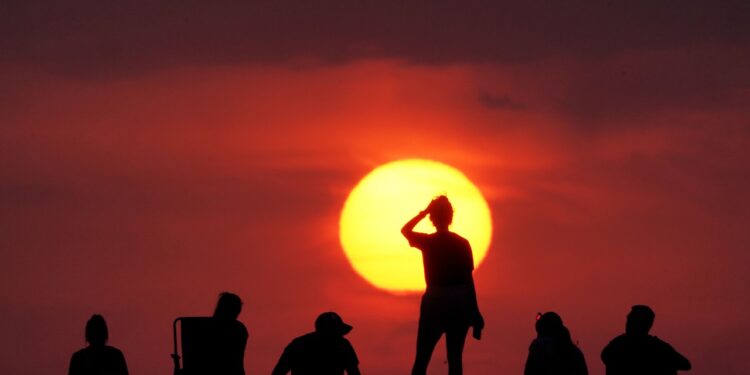Climate change made a recent Nordic heatwave approximately 2°C hotter and at least 10 times more likely, demonstrating that even historically cool nations are vulnerable to extreme heat events. Finland, Norway and Sweden experienced unprecedented temperatures above 30°C for two weeks in July, with Finland recording 22 consecutive days of such heat, causing hospitals to overheat, a surge in drownings, wildfires, toxic algal blooms and forcing indigenous Sami reindeer to seek shade in urban areas.
Healthcare systems are overwhelmed by unprecedented heat
The prolonged heatwave placed enormous strain on Nordic healthcare systems, which were neither designed nor equipped for such extreme temperatures. Hospitals became overcrowded and overheated as medical facilities struggled to cope with heat-related illnesses whilst maintaining safe operating temperatures for patients and staff.
People were observed fainting at outdoor events as the region’s infrastructure, built for cooler climates, failed to provide adequate relief from the unprecedented heat. The persistent high temperatures exposed fundamental vulnerabilities in systems designed for a climate that no longer exists in these traditionally temperate regions.
Infrastructure inadequacies exposed
Buildings throughout the Nordic countries are typically well-insulated but poorly ventilated, creating dangerous conditions during extreme heat events. Maja Vahlberg, a climate consultant at the Swedish Red Cross, emphasised that “our infrastructure was not built to withstand these extreme temperatures and our ageing population is increasingly susceptible to dangerous heat.”
The architectural design principles that serve Nordic countries well during harsh winters have become liabilities during summer heatwaves, trapping heat rather than allowing natural cooling. This infrastructure mismatch highlights the fundamental challenge facing cold-climate countries as global temperatures continue to rise.
Ecological and environmental impacts
The heatwave triggered widespread wildfires across the region, whilst water bodies experienced toxic algal blooms due to elevated temperatures. These environmental consequences demonstrate how extreme heat disrupts entire ecosystems, creating cascading effects that extend far beyond human health concerns.
There was also a documented surge in drownings as people sought relief in lakes, rivers, and coastal waters. The combination of inexperience with extreme heat safety measures and the psychological pressure to cool down led to tragic consequences in waterways throughout the region.
Indigenous communities face existential threats
The Sami people, Europe’s indigenous Arctic population who have traditionally herded reindeer for thousands of years, face particular challenges from rising temperatures. Reindeer normally migrate to higher ground during the summer months, but these elevated areas now provide insufficient relief from the heat, causing animals to overheat and struggle to find adequate food and water sources.
Warmer winters compound these problems by causing more precipitation to fall as rain rather than snow. The resulting freeze-thaw cycles create ice layers that prevent reindeer from accessing their traditional food sources beneath the snow, threatening the entire basis of Sami culture and livelihood.
Rapid climate attribution reveals fossil fuel impact
The World Weather Attribution study, conducted by two dozen European researchers, used rapid analysis techniques to directly link the heatwave’s intensity to human-caused climate change. The research demonstrated that fossil fuel emissions were the primary driver of the event’s severity.
Clair Barnes from Imperial College London stated that “climate change is fundamentally reshaping the world we live in,” noting that cold-climate countries are now experiencing unfamiliar levels of heat that strain health systems and disrupt traditional ways of life.
Accelerating Arctic warming trend
The likelihood of prolonged heat periods like the recent Nordic heatwave has almost doubled since 2018, when the region last experienced comparable intensity. This acceleration reflects broader patterns showing that Arctic regions are heating far faster than other parts of the planet.
The research indicates that what were once exceptional weather events are becoming increasingly common, with scientists warning that only “a rapid transition from fossil fuels to renewable energy” can slow and ultimately halt this dangerous warming trend.
REFH – Newshub, August 14, 2025




Recent Comments